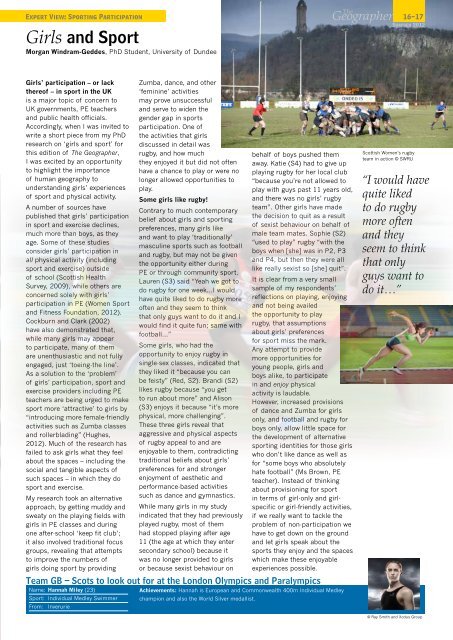Summer - Royal Scottish Geographical Society
Summer - Royal Scottish Geographical Society
Summer - Royal Scottish Geographical Society
You also want an ePaper? Increase the reach of your titles
YUMPU automatically turns print PDFs into web optimized ePapers that Google loves.
Expert View: Sporting Participation<br />
Girls and Sport<br />
Morgan Windram-Geddes, PhD Student, University of Dundee<br />
The<br />
Geographer 16-17<br />
<strong>Summer</strong> 2012<br />
Girls’ participation – or lack<br />
thereof – in sport in the UK<br />
is a major topic of concern to<br />
UK governments, PE teachers<br />
and public health officials.<br />
Accordingly, when I was invited to<br />
write a short piece from my PhD<br />
research on ‘girls and sport’ for<br />
this edition of The Geographer,<br />
I was excited by an opportunity<br />
to highlight the importance<br />
of human geography to<br />
understanding girls’ experiences<br />
of sport and physical activity.<br />
A number of sources have<br />
published that girls’ participation<br />
in sport and exercise declines,<br />
much more than boys, as they<br />
age. Some of these studies<br />
consider girls’ participation in<br />
all physical activity (including<br />
sport and exercise) outside<br />
of school (<strong>Scottish</strong> Health<br />
Survey, 2009), while others are<br />
concerned solely with girls’<br />
participation in PE (Women Sport<br />
and Fitness Foundation, 2012).<br />
Cockburn and Clark (2002)<br />
have also demonstrated that,<br />
while many girls may appear<br />
to participate, many of them<br />
are unenthusiastic and not fully<br />
engaged, just ‘toeing-the line’.<br />
As a solution to the ‘problem’<br />
of girls’ participation, sport and<br />
exercise providers including PE<br />
teachers are being urged to make<br />
sport more ‘attractive’ to girls by<br />
“introducing more female-friendly<br />
activities such as Zumba classes<br />
and rollerblading” (Hughes,<br />
2012). Much of the research has<br />
failed to ask girls what they feel<br />
about the spaces – including the<br />
social and tangible aspects of<br />
such spaces – in which they do<br />
sport and exercise.<br />
My research took an alternative<br />
approach, by getting muddy and<br />
sweaty on the playing fields with<br />
girls in PE classes and during<br />
one after-school ‘keep fit club’;<br />
it also involved traditional focus<br />
groups, revealing that attempts<br />
to improve the numbers of<br />
girls doing sport by providing<br />
Zumba, dance, and other<br />
‘feminine’ activities<br />
may prove unsuccessful<br />
and serve to widen the<br />
gender gap in sports<br />
participation. One of<br />
the activities that girls<br />
discussed in detail was<br />
rugby, and how much<br />
they enjoyed it but did not often<br />
have a chance to play or were no<br />
longer allowed opportunities to<br />
play.<br />
Some girls like rugby!<br />
Contrary to much contemporary<br />
belief about girls and sporting<br />
preferences, many girls like<br />
and want to play ‘traditionally’<br />
masculine sports such as football<br />
and rugby, but may not be given<br />
the opportunity either during<br />
PE or through community sport.<br />
Lauren (S3) said “Yeah we got to<br />
do rugby for one week…I would<br />
have quite liked to do rugby more<br />
often and they seem to think<br />
that only guys want to do it and I<br />
would find it quite fun; same with<br />
football…”<br />
Some girls, who had the<br />
opportunity to enjoy rugby in<br />
single-sex classes, indicated that<br />
they liked it “because you can<br />
be feisty” (Red, S2). Brandi (S2)<br />
likes rugby because “you get<br />
to run about more” and Alison<br />
(S3) enjoys it because “it’s more<br />
physical, more challenging”.<br />
These three girls reveal that<br />
aggressive and physical aspects<br />
of rugby appeal to and are<br />
enjoyable to them, contradicting<br />
traditional beliefs about girls’<br />
preferences for and stronger<br />
enjoyment of aesthetic and<br />
performance-based activities<br />
such as dance and gymnastics.<br />
While many girls in my study<br />
indicated that they had previously<br />
played rugby, most of them<br />
had stopped playing after age<br />
11 (the age at which they enter<br />
secondary school) because it<br />
was no longer provided to girls<br />
or because sexist behaviour on<br />
behalf of boys pushed them<br />
away. Katie (S4) had to give up<br />
playing rugby for her local club<br />
“because you’re not allowed to<br />
play with guys past 11 years old,<br />
and there was no girls’ rugby<br />
team”. Other girls have made<br />
the decision to quit as a result<br />
of sexist behaviour on behalf of<br />
male team mates. Sophie (S2)<br />
“used to play” rugby “with the<br />
boys when [she] was in P2, P3<br />
and P4, but then they were all<br />
like really sexist so [she] quit”.<br />
It is clear from a very small<br />
sample of my respondents’<br />
reflections on playing, enjoying<br />
and not being availed<br />
the opportunity to play<br />
rugby, that assumptions<br />
about girls’ preferences<br />
for sport miss the mark.<br />
Any attempt to provide<br />
more opportunities for<br />
young people, girls and<br />
boys alike, to participate<br />
in and enjoy physical<br />
activity is laudable.<br />
However, increased provisions<br />
of dance and Zumba for girls<br />
only, and football and rugby for<br />
boys only, allow little space for<br />
the development of alternative<br />
sporting identities for those girls<br />
who don’t like dance as well as<br />
for “some boys who absolutely<br />
hate football” (Ms Brown, PE<br />
teacher). Instead of thinking<br />
about provisioning for sport<br />
in terms of girl-only and girlspecific<br />
or girl-friendly activities,<br />
if we really want to tackle the<br />
problem of non-participation we<br />
have to get down on the ground<br />
and let girls speak about the<br />
sports they enjoy and the spaces<br />
which make these enjoyable<br />
experiences possible.<br />
Team GB – Scots to look out for at the London Olympics and Paralympics<br />
Name: Hannah Miley (23)<br />
Sport: Individual Medley Swimmer<br />
From: Inverurie<br />
Achievements: Hannah is European and Commonwealth 400m Individual Medley<br />
champion and also the World Silver medallist.<br />
<strong>Scottish</strong> Women’s rugby<br />
team in action © SWRU<br />
“I would have<br />
quite liked<br />
to do rugby<br />
more often<br />
and they<br />
seem to think<br />
that only<br />
guys want to<br />
do it…”<br />
© Ray Smith and Xodus Group








